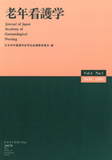Japanese
English
- 販売していません
- Abstract 文献概要
- 参考文献 Reference
本研究の目的は,作成したシートを用いて,痴呆の程度別「摂食リズムの乱れ」の特徴を客観的に捉えることである.アルツハイマー病の老年者6名(中等度,高度,最高度痴呆の各2名)に対して,初回評価(観察を主とした介入に基づく乱れの評価)と介入評価(計画的介入に基づく乱れの評価)を比較検討した結果,以下の知見を得た.
1.「摂食リズムの乱れ」とみなされたインターバルの出現回数は,摂食環境による注意力の乱れが多かった高度痴呆の1名を除き,あまり変化を認めなかった.しかしながら,インターバルの時間は,痴呆のおのおのの程度において有意に短縮した.
2.総摂食時間は,75.2±19.9分から55.7±17.4分と有意に短縮した.また,インターバルの時間と総摂食時間とは高い相関があり,インターバルの時間の短縮は総摂食時間の短縮化につながることが示された.
3.自動摂食の割合は,痴呆の重度化に伴い減少する傾向にあった.最高度痴呆で自動摂食の回復が困難な場合には,単にその回復を待つのではなく,他動摂食により摂食リズムの回復を促進することの重要性が示唆された.
4.痴呆性老人の「摂食リズムの乱れ」は,摂食サイクルの秩序性の乱れであり,インターバルの関与が大きいことが明らかにされた.
This paper describes the features of "feeding rhythm disorder" according to the severity of dementia as measured by the use of a recording sheet developed in our previous study. The subjects for this study were six elderly patients with Alzheimer's disease (two with moderate, two with severe and two with very severe dementia). Using this sheet, we compared the results of evaluation of feeding rhythm with basically no assistance given to the patient for feeding and evaluation of feeding rhythm with assistance given. The findings were as follows.
1. There was not a great change in the total number of "intervals" that were identified as "feeding rhythm disorder" except for in one patient with severe dementia. However, the total duration of such "intervals" changed significantly in all subjects.
2. In all subjects, the meal time became significantly shorter (75.2 ± 19.9 min to 55.7 ± 17.4 min). There was a strong correlation between the duration of "intervals" and meal time, suggesting that shortening the duration of "intervals" would lead shorter meal time.
3. The rate of self-feeding decreased with progression of dementia severity, indicating the importance of not merely waiting for the restoration of self-feeding in patients with very severe dementia but promoting the restoration of "feeding rhythm disorder" by assisted feeding.
4. "Feeding rhythm disorder" in elderly patients with dementia is a disorder of feeding cycles and is greatly influenced by "intervals".
Copyright © 1999, Japan Academy of Gerontological Nursing All rights reserved.


